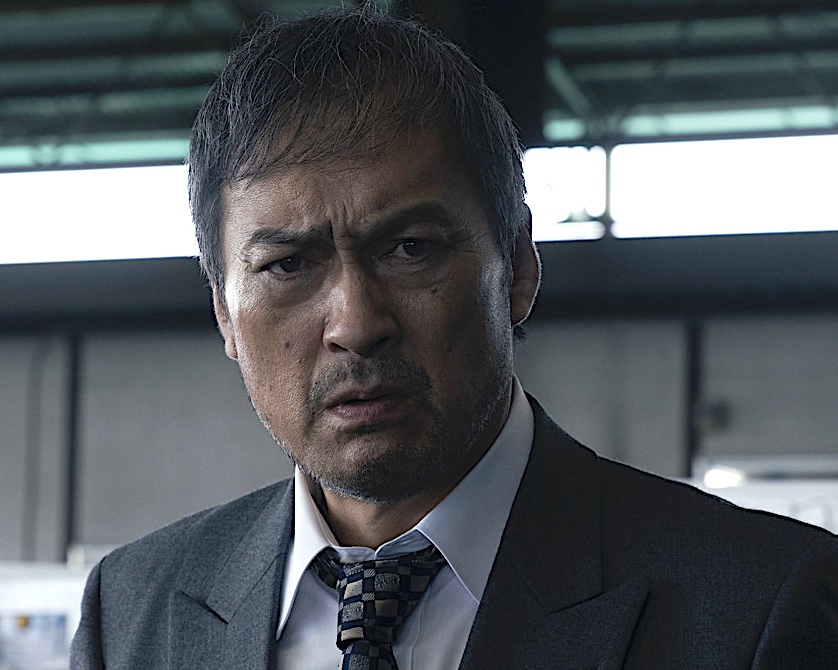It’s entirely fitting that Jake Adelstein should have a poster for All the President’s Men on the wall of his Tokyo apartment, since it was the filmic apogee of the notion of journalist as superstar. But where Alan J Pakula’s 1976 movie had Robert Redford and Dustin Hoffman as ace reporters Bob Woodward and Carl Bernstein, knocking the bottom out of Richard Nixon’s presidency with their coverage of the Watergate scandal, Tokyo Vice tracks the intrepid efforts of expatriate American crime reporter Adelstein to expose the murderous activities of the local yakuza gangs.
The series is based on the memoir by the real-life Adelstein, and the credits specify that it’s a fictional creation which draws on factual events. This is just as well, since the notion of this crusading white knight from Missouri exposing a cesspit of political and criminal larceny on the other side of the world often tests the bounds of credibility. “There were so many things that we embellished and created that had nothing to do with, let’s call it ‘the real Jake Adelstein story,'” admitted executive producer John Lesher.
 Not the least of these is the character of Adelstein himself. As played by the photogenic Ansel Elgort, he looks more like a Chanel runway model than a hard-bitten, overworked crime reporter. As with all screen representations of journalism, you never see anybody doing the hard slog of actually writing something. There’s one hilarious moment when Jake phones his editor, who’s having dinner in a restaurant, and asks if he can dictate his latest front page splash to her over the phone, apparently straight off the top of his head.
Not the least of these is the character of Adelstein himself. As played by the photogenic Ansel Elgort, he looks more like a Chanel runway model than a hard-bitten, overworked crime reporter. As with all screen representations of journalism, you never see anybody doing the hard slog of actually writing something. There’s one hilarious moment when Jake phones his editor, who’s having dinner in a restaurant, and asks if he can dictate his latest front page splash to her over the phone, apparently straight off the top of his head.
But anyway, it makes for an exciting ride, and as the second series’ 10 instalments unfold, the stakes grow increasingly daunting as Jake’s efforts – his Japanese colleagues on the Meicho newspaper are kept very much in his shadow, as his colleague Tin Tin (Kosuke Tanaka) points out – uncover a network of murder and corruption which reaches into the heart of the Japanese establishment. What elevates it from being a run-of-the-mill gangster story is the authenticity of the Japanese locations and characters.
Tokyo exudes sleaze, seduction and exoticism, its sleek modern buildings and freeways contrasting sharply with crowded alleyways and backstreet bars and diners. It’s set at the end of the 1990s, subtly evoked by the suitably dated cars, TVs, computer equipment and good old tape cassettes. Mobile phones have arrived, but smartphones haven’t been invented yet.
Some excellent performances by Japanese actors, such as Shun Sugata as yakuza boss Ishida and Makiko Watanabe as the shrewd wife of the merciless mobster Tozawa (Ayumi Tanida), add texture and emotional subtlety. Shô Kasamatsu excels in his portrayal of Sato, that rare phenomenon, a gangster with some semblance of a soul. Rachel Keller (pictured above) is consistently strong as Samantha, struggling to keep her nightclub operating without being totally overpowered by the Mob.
 Still, it wouldn’t be sensible to take it all too seriously. It’s amazing how Jake so often happens to be in the right place at the right moment to get yet another scoop, like the day he’s standing outside an apartment building with his notebook and camera when Tozawa’s henchmen throw a rival crime boss out of a high window. And while various gang members and unfortunate bystanders are routinely slaughtered, Jake lives a charmed life while he pursues his increasingly risky investigations.
Still, it wouldn’t be sensible to take it all too seriously. It’s amazing how Jake so often happens to be in the right place at the right moment to get yet another scoop, like the day he’s standing outside an apartment building with his notebook and camera when Tozawa’s henchmen throw a rival crime boss out of a high window. And while various gang members and unfortunate bystanders are routinely slaughtered, Jake lives a charmed life while he pursues his increasingly risky investigations.
Thanks to his friendship with world-weary detective Katagiri (stoically played by Ken Watanabe, pictured above), Jake is also able to leverage some help from the police, who of course find him indispensable. Even when Jake reluctantly flies back to Missouri for his father’s 60th birthday, he meets an old friend of his dad who’s able to give him a crucial bit of help in unpicking the story of how a Japanese gangster managed to get a fast-track liver transplant in Minnesota. Certainly the Japanese nation owes him a debt of gratitude for preventing the criminal underworld from seizing the reins of power in Tokyo.
But Tokyo Vice does have the vital ingredient of watchability. Hop aboard, and you’ll want to stay to see how it ends.















Add comment